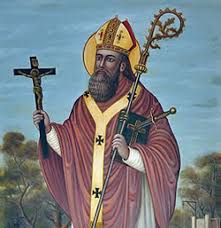HOMILY WEEK 09 01 – Year I
Practicing the Art of Fraternal Correction:
Memorial of St. Boniface
(Tob 1:1-2:8; Ps 112; Mk 12:1-12)
*****************************************
The term “fraternal correction” might not be used much these days, but certainly fits the gospel today, which invites us to believe in Jesus and act like Tobit.
The author of that first reading portrays Tobit as an ideal Jewish person, righteous all his life, walking in the ways of truth, full of compassion, and courageous enough to risk death to perform acts of charity such as burying the dead when to do so was to risk death by an oppressive regime.
In the gospel, the oppressive regime becomes the corrupt religious leaders of Jesus’ time, whom he tried to correct by sharing with them this parable about the vineyard tenants who resisted and ultimately killed the slaves sent to collect the produce.
Those slaves, we know, stand for all the prophets sent by God to admonish those very religious leaders who had over the centuries given themselves over to the false gods of possessions, prestige and power. So solidly entrenched were they in their infidelity and perversity that they would ultimately not only resist and kill the prophets, but also crucify the very Son of God sent to reveal to them the true nature of the God they professed to worship.
This was an ultimate attempt at “fraternal correction” on the part of Jesus, to reach out to the stubborn religious leaders of his day who had lost their way. They got the message, realizing the parable was really all about them, but were too addicted to those false gods to repent. They were prevented from taking Jesus by force only by the crowds who for the time being, were on Jesus’ side.
That same dynamic is felt today by some “whistle blowers” who dare to speak up about some unjust economic or political system in our society, and instead of being held up as heroes, are actually attacked and dis-credited by those who are benefitting from that injustice. Tobit is an Old Testament example of that all too human tendency.
We are invited today to be like him, to courageously stand strong in the face of injustice and oppression, regardless of the consequences, and to speak truth to power, which the prophets have done throughout the ages.

St Boniface
Today the church honours St. Boniface, who lived fully these teachings about both Tobit and Jesus. Born around 680 in Devonshire, England, he was given the name Wynfrid and raised in Benedictine monasteries. By 717, he was a renowned teacher and preacher, but gave up his work in response to a call to the mission field of northern Netherlands. In Rome, Pope Gregory II renamed him Boniface. He was made archbishop of Mainze by Pope Gregory III. Through his efforts to reorganize and regulate the church of the Franks, he helped shape Western Christianity, and many of the dioceses he proposed remain today.
At Geismar, Boniface made a tremendous impression by destroying the great Oak of Thor, an object of pagan worship, without being harmed by “the gods” (a missionary practice we would question today). He was martyred in Frisia in 754, along with 52 others, and his remains were returned to Fulda, where they rest in a sarcophagus which became a site of pilgrimage.
Boniface’s life and death as well as his work became widely known. After his martyrdom, he was quickly hailed as a saint in Fulda and other areas in Germania and in England. His cult is still notably strong today. Boniface is celebrated (and criticized) as a missionary, but he is regarded as a unifier of Europe, and is seen (mainly by Catholics) as a Germanic national figure.
The Eucharist is what sustained St. Boniface, and our daily manna as well. May it empower us to place all our faith in Jesus as Son of God and Word made Flesh, and to act like Tobit and St. Boniface.



